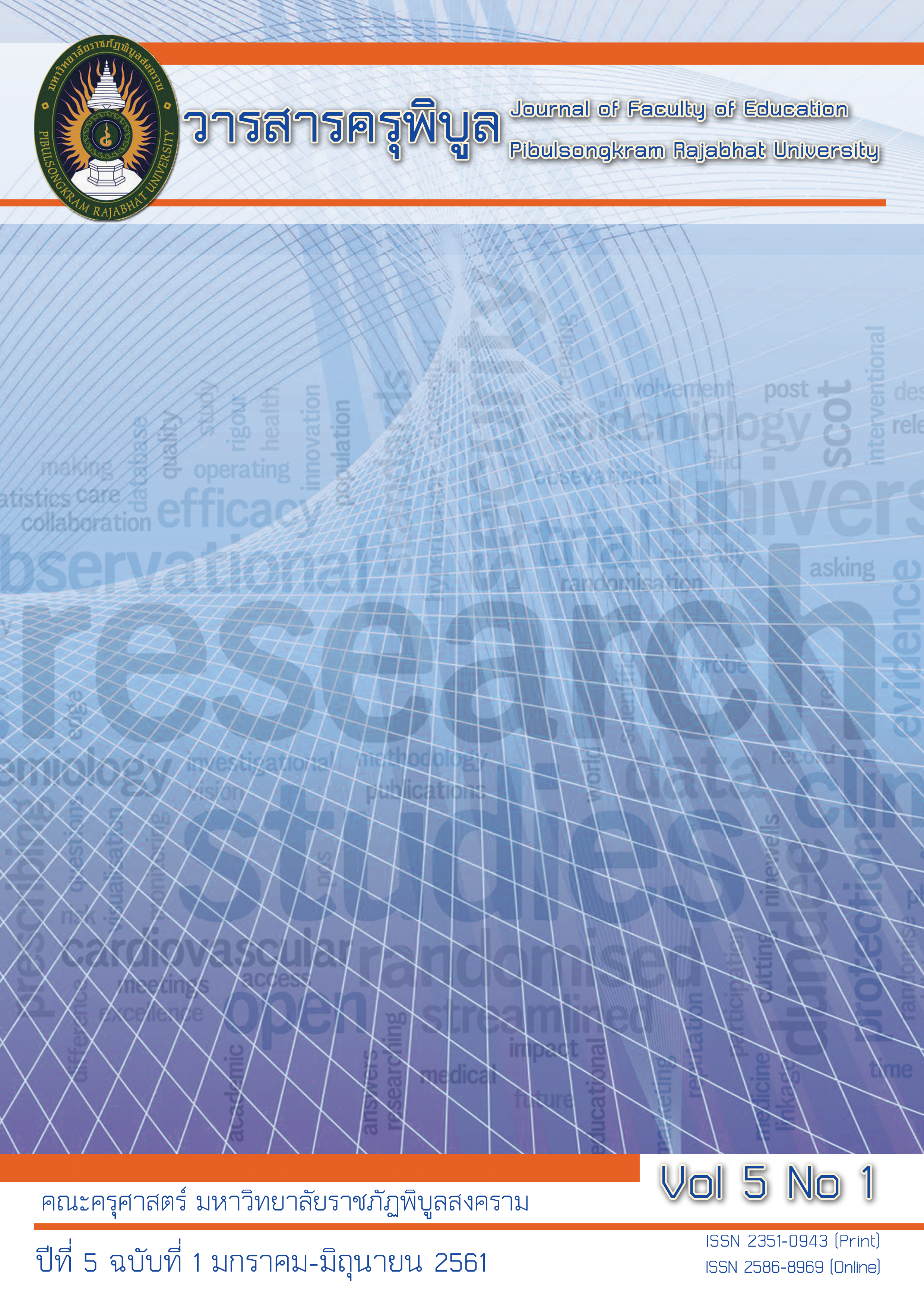การพัฒนากิจกรรมเพื่อเสริมสร้างจิตสาธารณะ สำหรับนักเรียนระดับชั้นมัธยมศึกษาตอนต้น สังกัดสำนักงานคณะกรรมการการศึกษาขั้นพื้นฐาน
Keywords:
Public Mind, enhance Public MindAbstract
The objectives of this research were 1) to study the problems and guidelines for creating activities by studying the documents, research and related theories including interview and inquire, heads of academic affairs and heads of activity development for learners, 2) to construct and test the quality of activities to reinforce public mind by 7 experts to evaluate the propriety of the activities, 3) to study the result of the activities to enhance pubic mind by trying out with 30 grade 7 students in the academic year of 2016 of Wat Barndong School under the Office of Primary Education Area 1 Phitsanulok by purposive sampling and evaluate the behavior by observing teachers and interviewing students’ guardians, 4) to study opinions on how to use the activity by giving the activities along with the questionnaire to reinforce the public mind to 15 teachers of activity development for learners to assess them.
The findings found that: 1) the director, teachers and communities lack cultivate the public mind, school curriculum do not define clear activities of public mind, students are not interested in environmental issues so causing pollution, and asking for a way to create an activity was found that the principles of activities, activities and assessment were most important, 2) to construct and test the quality of activities as follows: 2.1) the activity has 7 elements, principle and reason, concepts, learning process, objective, structure, content and evaluation comprising 3 learning units, 6 lesson plans, 2.2) the quality of the activities was very good ( = 4.66) 3) the effect of using public mind activities shows that students at a higher level are characterized, 4) the opinions on how to use the activity found that activities was highest level ( = 4.69).
References
ชัยวัฒน์ สุทธิรัตน์. (2555). สอนเด็กให้มีจิตสาธารณะ. (พิมพ์ครั้งที่ 5). กรุงเทพฯ: บริษัท วี พริ้น (1991) จำกัด.
พรทรัพย์ ชื่นในเมือง. (2554). ผลของการใช้ชุดกิจกรรมแนะแนวตามแนวคิดพฤติกรรม นิยมที่มีต่อการพัฒนาพฤติกรรมการมีจิตสาธารณะของนักเรียนชั้นมัธยมศึกษาปีที่ 2 โรงเรียนสตรีราชินูทิศ จังหวัดอุดรธานี. วิทยานิพนธ์ศึกษาศาสตรมหาบัณฑิต (การแนะแนว). มหาวิทยาลัยสุโขทัยธรรมาธิราช.
พรทิพย์ มนตรีวงศ์. (2554). การพัฒนาจิตสาธารณะในนักเรียนชั้นมัธยมศึกษาปีที่ 1 ด้วยการให้การศึกษากลุ่มแบบพิจารณาเหตุผลอารมณ์และพฤติกรรม. วิทยานิพนธ์วิทยาศาสตรมหาบัณฑิต (จิตวิทยาการให้คำปรึกษา). มหาวิทยาลัยบูรพา.
พูลสวัสดิ์ วรรณลา. (2557). แนวทางการพัฒนาจิตสาธารณะของนักเรียนชั้นประถมศึกษาสังกัดสำนักงาน เขตพื้นที่การศึกษาร้อยเอ็ด เขต 3. วิทยานิพนธ์ครุศาสตรมหาบัณฑิต (การบริหารการศึกษา). มหาวิทยาลัยราชภัฏร้อยเอ็ด.
มณฑลี เนื้อทอง. (2556). การหล่อหลอมจิตอาสาผ่านการอบรมขัดเกลาทางสังคมในครอบครัว. วิทยานิพนธ์ปริญญาคหกรรมศาสตรมหาบัณฑิต มหาวิทยาลัยสุโขทัยธรรมาธิราช.
Bandura, A. (1977). Social Learning Theory. England Cliffs, NJ: Prentice-Hall.
Bloom, B. S., Madaus, G. F., & Hastings, J. T. (1981). Evaluation to Improve Learning. Handbook II: Affective Domain. New York, NY: Mckey Company.
Kolhberg, L. (1969). Stage and Sequence: the Cognitive Development Approach to Socialization. In Goslin, D.A. (editor) Handbook of Socialization: Theory of Research. Chicago: Rand McNally & Co.
Piaget, J. (1976). The Moral Judgment of the Child. New York, NY: The Free Press.



